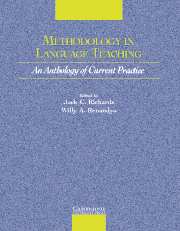Book contents
- Frontmatter
- Contents
- Acknowledgments
- Introduction
- Section I Approaches to Teaching
- Section 2 Lesson Planning and Classroom Management
- Section 3 Classroom Dynamics
- Section 4 Syllabus Design and Instructional Materials
- Section 5 Task and Project Work
- Section 6 Learning Strategies
- Section 7 Teaching Grammar
- Section 8 Teaching Pronunciation
- Section 9 Teaching Speaking
- Section 10 Teaching Listening
- Chapter 21 Listening in Language Learning
- Chapter 22 The Changing Face of Listening
- Chapter 23 Raising Students' Awareness of the Features of Real-World Listening Input
- Section 11 Teaching Vocabulary
- Section 12 Teaching Reading
- Section 13 Teaching Writing
- Section 14 Assessment
- Section 15 Technologies in the Classroom
- Section 16 Professional Development
- Credits
- Author Index
- Subject Index
- References
Chapter 21 - Listening in Language Learning
Published online by Cambridge University Press: 10 November 2010
- Frontmatter
- Contents
- Acknowledgments
- Introduction
- Section I Approaches to Teaching
- Section 2 Lesson Planning and Classroom Management
- Section 3 Classroom Dynamics
- Section 4 Syllabus Design and Instructional Materials
- Section 5 Task and Project Work
- Section 6 Learning Strategies
- Section 7 Teaching Grammar
- Section 8 Teaching Pronunciation
- Section 9 Teaching Speaking
- Section 10 Teaching Listening
- Chapter 21 Listening in Language Learning
- Chapter 22 The Changing Face of Listening
- Chapter 23 Raising Students' Awareness of the Features of Real-World Listening Input
- Section 11 Teaching Vocabulary
- Section 12 Teaching Reading
- Section 13 Teaching Writing
- Section 14 Assessment
- Section 15 Technologies in the Classroom
- Section 16 Professional Development
- Credits
- Author Index
- Subject Index
- References
Summary
INTRODUCTION
Listening is the Cinderella skill in second language learning. All too often, it has been overlooked by its elder sister: speaking. For most people, being able to claim knowledge of a second language means being able to speak and write in that language. Listening and reading are therefore secondary skills – means to other ends, rather than ends in themselves.
Every so often, however, listening comes into fashion. In the 1960s, the emphasis on oral language skills gave it a boost. It became fashionable again in the 1980s, when Krashen's (1982) ideas about comprehensible input gained prominence. A short time later, it was reinforced by James Asher's (1988) Total Physical Response, a methodology drawing sustenance from Krashen's work, and based on the belief that a second language is learned most effectively in the early stages if the pressure for production is taken off the learners. During the 1980s, proponents of listening in a second language were also encouraged by work in the first language field. Here, people such as Gillian Brown (see, for example, Brown, 1990) were able to demonstrate the importance of developing oracy (the ability to listen and speak) as well as literacy, in school. Prior to this, it was taken for granted that first language speakers needed instruction in how to read and write, but not how to listen and speak because these skills were automatically bequeathed to them as native speakers.
Information
- Type
- Chapter
- Information
- Methodology in Language TeachingAn Anthology of Current Practice, pp. 238 - 241Publisher: Cambridge University PressPrint publication year: 2002
References
Accessibility standard: Unknown
Why this information is here
This section outlines the accessibility features of this content - including support for screen readers, full keyboard navigation and high-contrast display options. This may not be relevant for you.Accessibility Information
- 45
- Cited by
